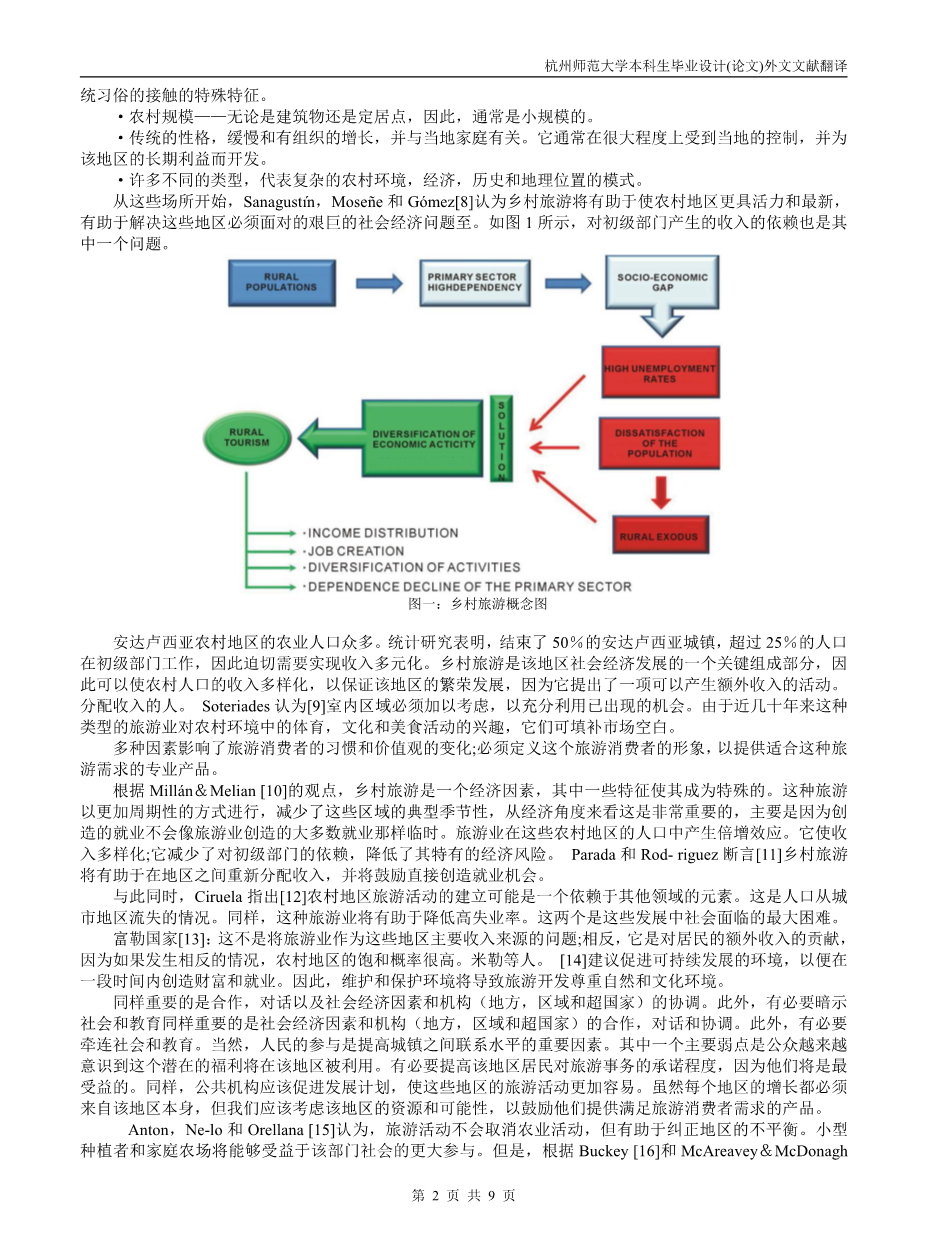

英语原文共 9 页,剩余内容已隐藏,支付完成后下载完整资料
Rural Tourism in the South of Spain: An Opportunity for Rural Development
Genoveva Millaacute;n Vaacute;zquez de la Torre1, Luis Amador Hidalgo2, Juan Manuel Arjona Fuentes1
1Departament of Quantitative Methods, Universidad Loyola Andaluciacute;a, Coacute;rdoba, Spain
2Departament of Economics, Universidad Loyola Andaluciacute;a, Coacute;rdoba, Spain
ABSTRACT
Tourism is one of the most enriching experiences, and even more so if it involves a rural habitat, in contact with the environment. This kind of tourism, one of the most requested by society currently, offers a great chance for developing rural areas. Rural tourism has become the solution for some problems that have become evident in those areas: the high rate of unemployment, rural exodus and primary sector dependence. So the practice of this activity will generate and diversify income, and create employment. For this reason it is necessary to offer a product adapted to consumer tourist demand, and therefore it is essential to know profile of the tourist. The Andalusian region, in the south of Spain, is famous for being a tourist area of great singularity exhibiting differ- ent degrees of development and models of touristic exploitation, strongly characterized by its offer of sun and beach. Today, this community does not limit itself to offering only a sun and beach experience since not all tour- ists that choose it as their destination have exclusive preference for this sector. Among all the new proposals, one modality is rural tourism, which is the focal point of this study, especially those initiatives for rural tourism in natural parks. Rural tourism is a development factor that will help to correct regional imbalances. Developmen- tal politics related directly to wealth generation in these rural areas can be bolstered by this activity. This study will estimate a forecast to model monthly rural tourist demand in Andalusia for 2014. Its aim is to reveal its evo- lution in the immediate future in order to propose measures to encourage activity in said tourism sector, by making use of the 24 natural parks and protected areas located in this region.
KEYWORDS
Rural Tourism; Rural Development; Natural parks; Andalusia; Demand Forecast
- Introduction
Rural tourism is a tool to further regional development where there is a socioeconomic imbalance. In Spain, rural areas with low levels of income and productivity still prevail. Generally, they focus their production on economic activities directly related to the primary sector and suffer high rates of unemployment. They need to diversify their income.
These regions need sustainable growth through an economic culture based on the efficient administration of rural resources, involving the population whose main aim is to achieve a socioeconomic and environmental balance. According to Etxano [1], rural tourism will provide additional income to what they already receive and stable employment. All in all, it will contribute to reducing poverty and redistributing income. We do not propose making tourism the main source of income in these regions, but we feel it could be an additional income contribution for the inhabitant.
Mediano [2] and Buckley [3] point out that when tourists wish to enjoy the natural environment, they are in- clined to opt for rural tourism in contact with that natural environment to get away from traditional sun and sea tourism, because the latter tourism no longer satisfies new inclinations that have been appearing in our society in recent years. What makes rural tourism a more popular emerging tourism is that the environment is a cause for concern in society, involving the search for sustainable development along with the need to seek satisfaction in onersquo;s free time, for example by being in contact with nature or staying with a family. It satisfies needs that the tourist feels nowadays to a greater degree, assert Devesa, Laguna amp; Palacios [4]. A new market niche has made its appearance due to this change in values of current tourist consumers. Rural areas can take advantage of this niche to generate additional income.
Rural Tourism: Economic Factor in Rural Areas
Although our research deals with rural tourism, we are not going to delve too deeply into the complex current bibliography to define what rural tourism means and involves. Experts use different criteria to establish their definitions with clarity and accuracy which means that even today there is no unanimous one. In fact, we can find that the term has different meanings. The first one, by Traverso [5] says: “the tourist activity of sustainable establishment in the rural environment” and the second, by Blanco [6] says: “a singular expression of the new ways of tourism, characterized by: 1) being developed away from urban settlements generally; 2) using diverse natural or cultural resources characteristic of rural environment resources; 3) contributing to local development and to tourism diversification and competitiveness.
Consequently, as Lane [7] says, rural tourism in its purest form should be:
- Located in rural areas.
- Functionally rural—built upon the rural worldrsquo;s special features of small-scale enterprise, open space, contact with nature and the natural world, heritage, traditional societies and traditional practises.
- Rural in scale—both in terms of buildings and settle-
ments—and, therefore, usually small-scale.
- Traditional in character, growing slowly and organically, and involved with local families. It will often be very largely controlled locally and developed for the long term good of the area.
- Of many different kinds, representing the complex
pattern of rural environment, economy, history and location.
Starting from these premises, 资料编号:[278082],资料为PDF文档或Word文档,PDF文档可免费转换为Word
您可能感兴趣的文章
- 国家和地方政府债务:分析外文翻译资料
- 外商直接投资是促进还是抑制了中国农业的高质量发展?外文翻译资料
- 公司业绩对股价的影响 ——对塞尔维亚精选公司的实证分析外文翻译资料
- 中国医疗保健需求、卫生服务使用和医疗支出财政负担的不平等:来自江苏省连续家庭监测研究的结果外文翻译资料
- 税收绩效:比较研究外文翻译资料
- 2005- 2007年欧洲碳价格的价格驱动因素和结构性突破外文翻译资料
- 人口老龄化对城乡居民医疗支出影响的研究—在健康,医疗保健和政策的交叉点外文翻译资料
- 中国全面二孩政策的影响外文翻译资料
- 电子商务环境下中国消费者对生鲜产品组合属性的偏好外文翻译资料
- 法实论奢侈品牌营销:近期研究课题与对策外文翻译资料


